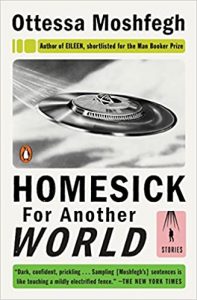To say the least, I think this story was more strange and convoluted than the rest of Otessa Moshfegh’s stories combined.  The point of view was very different as well in comparison to the narrators in all of her other stories as well. For one, the narrator in this story is a young child, who has a voice that is very detached and contradicts the typical internal monologue of a young girl. The narrator believes that this story is about finding relief from the pain of being in her own body, and that in order to go back to where she originates from she needs to either die or find the person that she needs to kill. Everyone in this story has odd sounding names, which originally made me believe that this was just a kids’ game or something similar to begin with. However, the way that the narrator takes this so seriously leads readers to think that there is more at play here than what meets the eye. The narrator, Urszula, tends to be thinking to herself more than speaking or writing throughout the story, and she internalizes most of her thoughts and opinions. Even so, she still interacts with Waldemar often without saying much of anything, and the connection that they have is maximized upon, especially with Waldemar’s reluctance to let the narrator try to kill Jarek Jaskolka. A prime example of this is when Urszula states, “I try to sound cheerful, like I don’t know that Waldemar’s heart is broken. He can see right through me, He has that ability, as my brother” (pg 288).
The point of view was very different as well in comparison to the narrators in all of her other stories as well. For one, the narrator in this story is a young child, who has a voice that is very detached and contradicts the typical internal monologue of a young girl. The narrator believes that this story is about finding relief from the pain of being in her own body, and that in order to go back to where she originates from she needs to either die or find the person that she needs to kill. Everyone in this story has odd sounding names, which originally made me believe that this was just a kids’ game or something similar to begin with. However, the way that the narrator takes this so seriously leads readers to think that there is more at play here than what meets the eye. The narrator, Urszula, tends to be thinking to herself more than speaking or writing throughout the story, and she internalizes most of her thoughts and opinions. Even so, she still interacts with Waldemar often without saying much of anything, and the connection that they have is maximized upon, especially with Waldemar’s reluctance to let the narrator try to kill Jarek Jaskolka. A prime example of this is when Urszula states, “I try to sound cheerful, like I don’t know that Waldemar’s heart is broken. He can see right through me, He has that ability, as my brother” (pg 288).
I thought it was particularly interesting how Waldemar was very helpful to the narrator at first, by coming up with the other way to get to the better place, but once Urszula believed that she found the person she needed to kill he immediately became somber and tried to prevent her from doing so. This led me to believe that Waldemar may have only come up with the idea that killing someone was the only other way to go back to the better place because he thought that it was impossible for Urszula to do. With death as the only option originally, I think he may have intended to have the other option as a way to give his sister some hope and a will to keep living, but instead it backfired. However, the style of writing Ottessa Moshfegh uses in this story makes it increasingly impossible to tell whether or not the narrator is telling the truth, or whether this is simply a game between children in order to escape the harsh reality that is the real world they live in. I think that the childish perspective the narrator and her brother have of the world represents the loss of innocence that most of the other narrators in her stories have already experienced and adapted to long ago, and it helps readers to understand fully what it means to get to the point that the adults in the other stories are already at. For all of them, there must have been a point when they realized that the real world is much more of a disgusting, cruel place than they originally thought, and Ottessa Moshfegh captures this emotion in her last story perfectly well. Overall, I think that this story is the best way to wrap up her book, and the unique perspective it provides into the imperfect world we all have to live in and the desire people have to find a place better than the one we have gives all the previous stories a lot more depth as well.
I think that Ottessa had the narrator of this story be a young child because she knows that children are not exempt from bad things. Children feel as deeply as adults, and they can be perceptive about the true ways of the world. The child has no hope and wants to leave. It is all she can think about and no one, not even her beloved brother, is enough to stop her. For her own piece of mind, she has to leave. I agree that this story is the best way to wrap up the book; it is also the most poignant one.